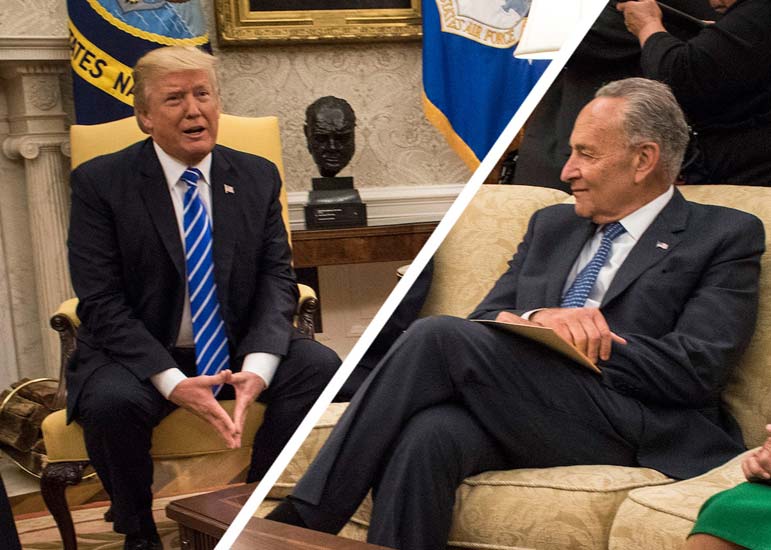 Bill O'Leary for The Washington Post
Bill O'Leary for The Washington Post
Thus Chuck Schumer, speaking about his new best friend, Donald Trump. Schumer does indeed have some natural affinity with the president. The former was born in Brooklyn, the latter in Queens. They are both sons of the outer boroughs of New York City, men who will always know that Manhattan looks down on them.
Last week a live microphone picked up Senator Schumer's account of his most recent conversation with the president. "I said, 'Mr. President, you're much better off if you can sometimes step right and sometimes step left. If you have to step just to one direction, you're boxed.' He gets that. . . . It's going to work out, and it'll make us more productive, too."
It seems like the craziest idea in modern American political history. A Republican president, whose party controls both houses of Congress and who enjoys enduring popularity among Republican voters, is playing footsie with the Democrats. The ghastly possibility is dawning on Trump's most ardent supporters on the right that he might be contemplating outright defection, to become the first bipartisan president in American history.
It all began 11 days ago, when Trump stunned his fellow Republicans by - seemingly on an impulse - agreeing to the Democratic leadership's proposal: "Chuck and Nancy [Pelosi]" would vote for aid for the victims of Hurricane Harvey if the debt ceiling were raised and government funding continued for just three months. Trump's own side had been looking to raise the debt ceiling for a year and a half.
This was no aberration. Two weeks ago, Attorney General Jeff Sessions announced the end of the program known as DACA (Deferred Action for Childhood Arrivals). On Thursday Trump stunned Republicans a second time by signaling his willingness to grant permanent legal status to the so-called dreamers as part of another deal with Democrats. Was this deal going to be contingent on the Dems agreeing to fund Trump's wall along the US-Mexico border? Nope.
All across conservative America the cry went up: What just happened? Breitbart, the right-wing website, denounced "Amnesty Don" in a glaring red headline. Ann Coulter, author of "In Trump We Trust," tweeted bitterly: "At this point, who DOESN'T want Trump impeached?"
So what did just happen? The knee-jerk answer is that Trump just committed political suicide. Yet it is always a mistake to assess Donald Trump by the yardsticks of conventional politics. First, let's consider the polling data. You might think Republican voters would hate what Trump just did as much as Ann Coulterdoes. You would be wrong. More than two-thirds of people who voted for Trump last year say underage illegal immigrants should be allowed to stay if they have been here 10 years and have graduated from high school.
What's more, a poll last week by Rasmussen Reports found that two-thirds of likely voters think it's good for the country if Trump works with congressional Democrats. Among Republicans, the proportion rises to 72 percent.
Second, consider the setting: a Washington widely despised by the electorate, only 16 percent of whom give Congress a positive rating.
How Republican is the White House these days anyway? The final outcome of the power struggle there was the near disappearance of both the conservative element (Reince Priebus) and the populists (Steve Bannon). What remains are the generals (John Kelly, H.R. McMaster), who are by training unpolitical, and the New York RINOs ("Republicans In Name Only," who are essentially Democrats (Jared Kushner, Gary Cohn).
Recall the complaints at last year's GOP national convention that Trump and his close advisers were "Republidents"- half Republican, half Independent. Recall, too, Trump's rage at the Republican leadership's failure to deliver on health care reform.
It seems at first sight unimaginable that the president could make a regular habit of cooperating with the Democrats. Doing so would make his already bad relations with the Republican leadership unsalvageable. Moreover, the Democrats expect to make significant gains in the midterm elections, so they have little incentive to compromise with an unpopular president. They, too, need to worry about their base, which has motivated itself since last November by pledging to resist the Trump tyranny.
Republicans are counting on the Democrats to self-harm, whether through the return of Hillary Clinton to the political scene to hawk her "It Should've Been Me!" memoir, or the readiness of the left of the party to descend into identity politics.
But what if the real threat to Republicans is posed by the man who, like a cuckoo in the nest, they were forced to nominate as their candidate last year? If the Democrats seem likely to win back the House, Trump has every reason to flirt with "Chuck and Nancy." Trading immunity for the things he and they can agree on, like a big infrastructure bill, might be his best hope of avoiding impeachment.
Past presidents have changed party allegiance while in office. John Quincy Adams, elected as a Democratic-Republican, became a Whig after he was elected in 1824. John Tyler ceased to be a Whig after he became president in 1841. And Lincoln ran in 1864 not as a Republican but as the leader of the National Union Party.
Could Trump run for reelection in 2020 as a RINO? It seems nuts. But so did 2016.
Previously:
• 09/07/17: Hell hath no fury like a spurned EU
• 08/29/17: The Coming World Crisis
• 08/23/17: There's more than one side to the story
• 08/16/17: What the second most powerful man in a country one-fifth of humanity is reading this summer --- and why it matters
• 08/08/17: America's Left must stop ever-rising tyranny. Or else
• 07/18/17: Our beloved, corrupt, low-life president
• 05/31/17: The value of Trump's vow with the Saudis to battle extremism
• 05/10/17: Is social democracy shattered?
• 04/19/17: Are we on the brink of a second Korean War?
• 04/04/17: Watching the EU destruct
• 03/28/17: What comes before jihad
• 03/22/17: China has taken on Silicon Valley, and guess who is winning?
• 03/15/17: Cyber War I has already begun
• 03/07/17: Shades of Nixon: Why Trump must tread carefully in the swamp
• 02/28/17: In praise of American militarism
• 02/21/17: The global network has become dangerously unstable
• 02/14/17: The battles the president can -- and must -- win
• 02/07/17: Dr. Donald And Mr. Trump
• 01/31/17: The nature of power in the networked age
• 01/24/17: Can Trump's art of the deal make America great again?
• 01/18/17: The 'Wettergate' delusion
• 12/14/16: I was wrong
• 12/06/16: Trump's Mad Dog is the sane warrior we need to make the world safer
• 11/30/16: Trump's Catch-22
• 11/10/16: Populism as a backlash against globalization: Historical perspectives
• 10/05/16: Simplifiers v. complicators
• 09/27/16: From Jolie-Pitt to the jolly pit of globaloney
• 09/21/16: The fight isn't going Hillary's way
• 06/28/16: The year of living improbably
• 05/17/16: Welcome to 1984
• 04/19/16: The rise of caveman politics
• 04/05/16: Tay, Trump, and artificial stupidity


 Contact The Editor
Contact The Editor
 Articles By This Author
Articles By This Author